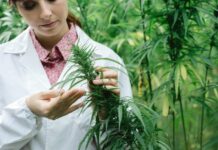
A May 2019 study suggests that cannabis use was not an independent ischemic risk factor, contradicting previous research.
Strokes cause approximately 1 out of every 20 deaths in the United States each year, claiming the life of one American every four minutes, according to the Centers for Disease Control and Prevention (CDC).
Considering around 87% of all strokes are ischemic strokes, which is the result of reduced blood flow to the brain, stroke prevention strategies should target medical and lifestyle risk factors.
Cannabis Not a Risk Factor
A recent study, published in Neurology on May 7, 2019, aimed to determine the association between cannabis use and acute ischemic stroke. It concluded that recent cannabis use was not an independent ischemic stroke risk factor.
But in recent years, a number of other published studies have highlighted an increased stroke risk in relation to cannabis. One 2018 study in the International Journal of Stroke reported that the risk of ischemic stroke could increase by as much as 29% among recreational marijuana users. While there are still many variables to consider and causation was not established, this data was alarming to the public.
“The studies that come out on the dangers of cannabis have many issues in terms of direct causation, said Dr. Bonni Goldstein, Medical Director at Canna-Centers Wellness & Education in Lawndale, California; a medical adviser to WeedMaps, and author of “Cannabis Revealed.” “It is extremely difficult to separate out the vast number of variables that confound these types of studies.”
Image from animation of stroke (Blausen Medical Communications, Inc./Wikimedia Commons)
For example, stroke risk may be exacerbated by certain conditions, such as diabetes or obesity. In addition, the researchers from the 2018 study were unsure whether an increased risk depends on dosage, whether it’s due to the consumption of other substances, or if any number of other possible variables are involved.
Goldstein, who is also the Medical Director at Canna-Centers Wellness & Education, claims that the 2018 study does not account for whether patients who had strokes also used alcohol, tobacco, illicit drugs, or pharmaceuticals. Without taking those variables into consideration, the report is “not particularly useful” and could mislead health-care professionals.
“The authors of this report state that they cannot establish causation between the risk of stroke and recreational cannabis use, and this is unfortunate because they are putting out a headline which is meant to scare people,” she said.
Existing Medical Conditions and Other Variables
Evidence suggests that cannabis acts as a beneficial tool for many ailments, including those living with daily pain or nausea. However, it is also important to recognize the potential risks involved, particularly among those with a history of cardiovascular disease.
Experts often urge older adults to use the lowest dose of cannabis, as the consumption method and tolerance are key considerations. In addition, researchers recommend that anyone who has a history of heart disease or any other cardiovascular condition avoid THC. Instead, they can utilize the non-psychoactive alternative, cannabidiol (CBD). Instead, they can utilize the non-psychoactive alternative, cannabidiol (CBD).
While the relationship between cannabis use and heart disease remains largely theoretical, cannabis can cause blood pressure and heart rate to increase, an important consideration for heart patients.
A 2017 study, published in the American Heart Association journal Stroke, examined 49,321 Swedish men and found no association between cannabis use and stroke risk in young adults, including strokes before the age of 45. However, they did find a clear association between smoking tobacco and increased stroke risk.
Neuroprotective Properties of Cannabis
Cannabis may show signs of reducing stroke risk, Goldstein said.
“Interestingly, cannabinoids have been shown to be neuroprotective antioxidants which support the brain, and CBD has been shown to be protective against stroke,” Goldstein explained.
There are studies that support Goldstein’s claim. A 2010 Swiss study found that CBD “exerts positive pharmacological effects in ischemic stroke and other chronic diseases.” Additionally, in a 2005 study published in Stroke, researchers concluded that the neuroprotective effect of CBD may be related to an increase in cerebral blood flow through the serotonin-1A receptor.
Dr. Bonni Goldstein, Medical Director at Canna-Centers Wellness & Education in Lawndale, California; a medical adviser to WeedMaps, and author of “Cannabis Revealed.”
Goldstein then said, “So this particular report about an increased risk of stroke for marijuana users, which has not been published in a peer-reviewed scientific journal, is inconsistent with the current knowledge of cannabinoids and the brain.”
There are also concerns surrounding post-stroke immune responses, particularly with inflammation. Even after a patient receives tissue plasminogen activator (tPA), a protein that dissolves blood clots if injected up to 4 1/2 hours following stroke onset, they still face potential complications, such as increased inflammation.
After a patient receives stroke treatment, continuing inflammation can cause brain damage, potentially leading to a progressive decline in cognitive function. To address this concern, researchers are looking for solutions to target post-stroke inflammation. According to Goldstein, cannabinoids have demonstrated the ability to block the release of pro-inflammatory compounds, and that further research is needed to fully comprehend the benefits.
“Clinically, I see patients with autoimmune disorders such as rheumatoid arthritis and lupus benefit from cannabinoids, as well as patients with osteoarthritis, degenerative neck and back disease, and other chronic pain and inflammatory conditions,” she said.











